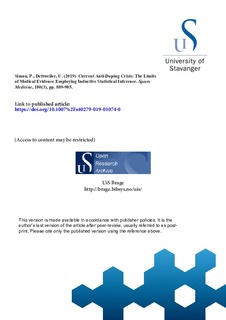Current Anti-Doping Crisis: The Limits of Medical Evidence Employing Inductive Statistical Inference
Journal article, Peer reviewed
Accepted version
Permanent lenke
http://hdl.handle.net/11250/2588273Utgivelsesdato
2019-02Metadata
Vis full innførselSamlinger
Originalversjon
Simon, P., Dettweiler, U. (2019) Current Anti-Doping Crisis: The Limits of Medical Evidence Employing Inductive Statistical Inference. Sports Medicine, https://doi.org/10.1007%2Fs40279-019-01074-0 10.1007%2Fs40279-019-01074-0Sammendrag
The anti-doping system is supposed to level the playing field and protect clean athletes. Doping scandals of the past two decades have seriously questioned the effectiveness of the worldwide anti-doping program, and criminal investigations associated with those scandals have created evidence for its partial ineffectiveness. However, legal action often succeeded because of activities from within the anti-doping community, such that the looming ineffectiveness could still be interpreted as a sign of an isolated shortcoming of the drug-testing program, while the overall “system of anti-doping” was still effective and working. In other words, from within the anti-doping system, we may not be able to assess its own effectiveness.
In this situation, recent scientific investigations revealing a high prevalence of doping in elite sports implicate ineffectiveness of the fight against doping in general and stress the importance of independent anti-doping research activities. However, these and other similar research activities investigate praxeological aspects of anti-doping. They will depend on the level of independence and the level of cooperation extended by organized sports to the scientists involved, which will in turn limit the capabilities of such research efforts.
In this issue of Sports Medicine, Heuberger and Cohen publish a systematic review that could provide important alternative directions for future anti-doping research. The authors argue from an epistemological point of view and question what constitutes a doping procedure in the first place, and they challenge the methodological robustness of medical evidence that has been generated to elucidate performance-enhancing effects of doping substance classes.
Beskrivelse
This is a post-peer-review, pre-copyedit version of an article published in Sports Medicine. The final authenticated version is available online at: https://doi.org/10.1007%2Fs40279-019-01074-0.
